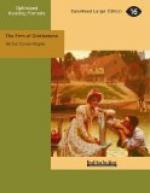“I’ve come here begging,” said Mr. Jefferson Edwards, producing a portentous-looking roll of paper from an inner pocket. “Know I’ve come to the right place for charity. The Aboriginal Evolution Society, my dear boy. All it wants are a few hundreds to float it off. Noble aim, Girdlestone—glorious object.”
“What is the object?” the merchant asked.
“Well, the evolution of the aborigines,” Edwards answered in some confusion. “Sort of practical Darwinism. Evolve ’em into higher types, and turn ’em all white in time. Professor Wilder gave us a lecture about it. I’ll send you round a Times with the account. Spoke about their thumbs. They can’t cross them over their palms, and they have rudimentary tails, or had until they were educated off them. They wore all the hair off their backs by leaning against trees. Marvellous things! All they want is a little money.”
“It seems to be a praiseworthy object,” the merchant said gravely.
“I knew that you would think so!” cried the little philanthropist enthusiastically. “Of course, bartering as you do with aboriginal races, their development and evolution is a matter of the deepest importance to you. If a man came down to barter with you who had a rudimentary tail and couldn’t bend his thumb—well, it wouldn’t be pleasant, you know. Our idea is to elevate them in the scale of humanity and to refine their tastes. Hewett, of the Royal Society, went to report on the matter a year or so back, and some rather painful incident occurred. I believe Hewett met with some mishap—in fact, they go the length of saying that he was eaten. So you see we’ve had our martyrs, my dear friend, and the least that we can do who stay at home at ease is to support a good cause to the best of our ability.”
“Whose names have you got?” asked the merchant.
“Let’s see,” Jefferson Edwards said, unfolding his list. “Spriggs, ten; Morton, ten; Wigglesworth, five; Hawkins, ten; Indermann, fifteen; Jones, five; and a good many smaller amounts.”
“What is the highest as yet?”
“Indermann, the tobacco importer, has given fifteen.”
“It is a good cause,” Mr. Girdlestone said, dipping his pen into the ink-bottle. “’He that giveth’—you know what the good old Book says. Of course a list of the donations will be printed and circulated?”
“Most certainly.”
“Here is my cheque for twenty-five pounds. I am proud to have had this opportunity of contributing towards the regeneration of those poor souls whom Providence has placed in a lower sphere than myself.”
“Girdlestone,” said the member of Parliament with emotion, as he pocketed the cheque, “you are a good man. I shall not forget this, my friend; I shall never forget it.”
“Wealth has its duties, and charity is among them,” Girdlestone answered with unction, shaking the philanthropist’s extended hand. “Good-bye, my dear sir. Pray let me know if our efforts are attended with any success. Should more money be needed, you know one who may be relied on.”




